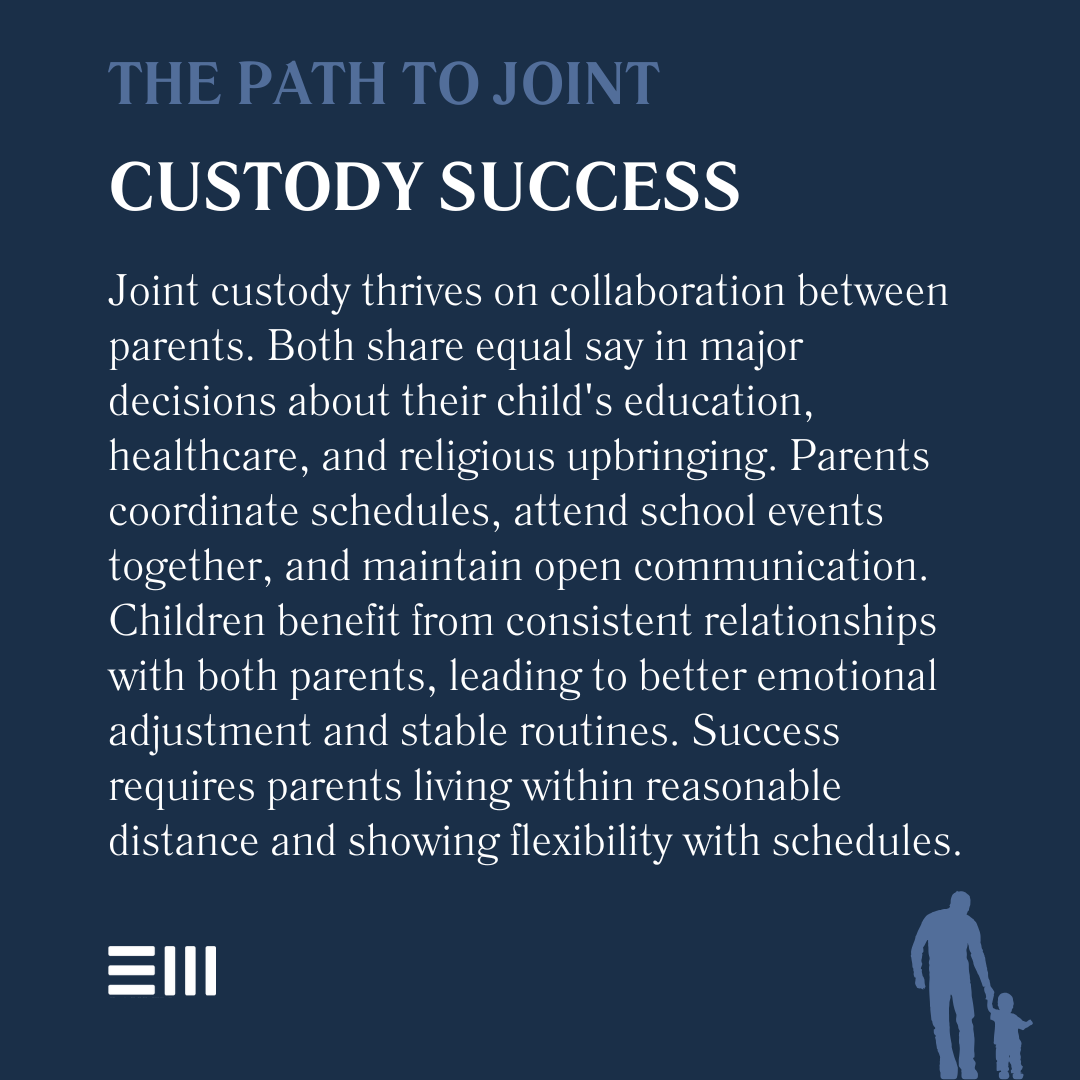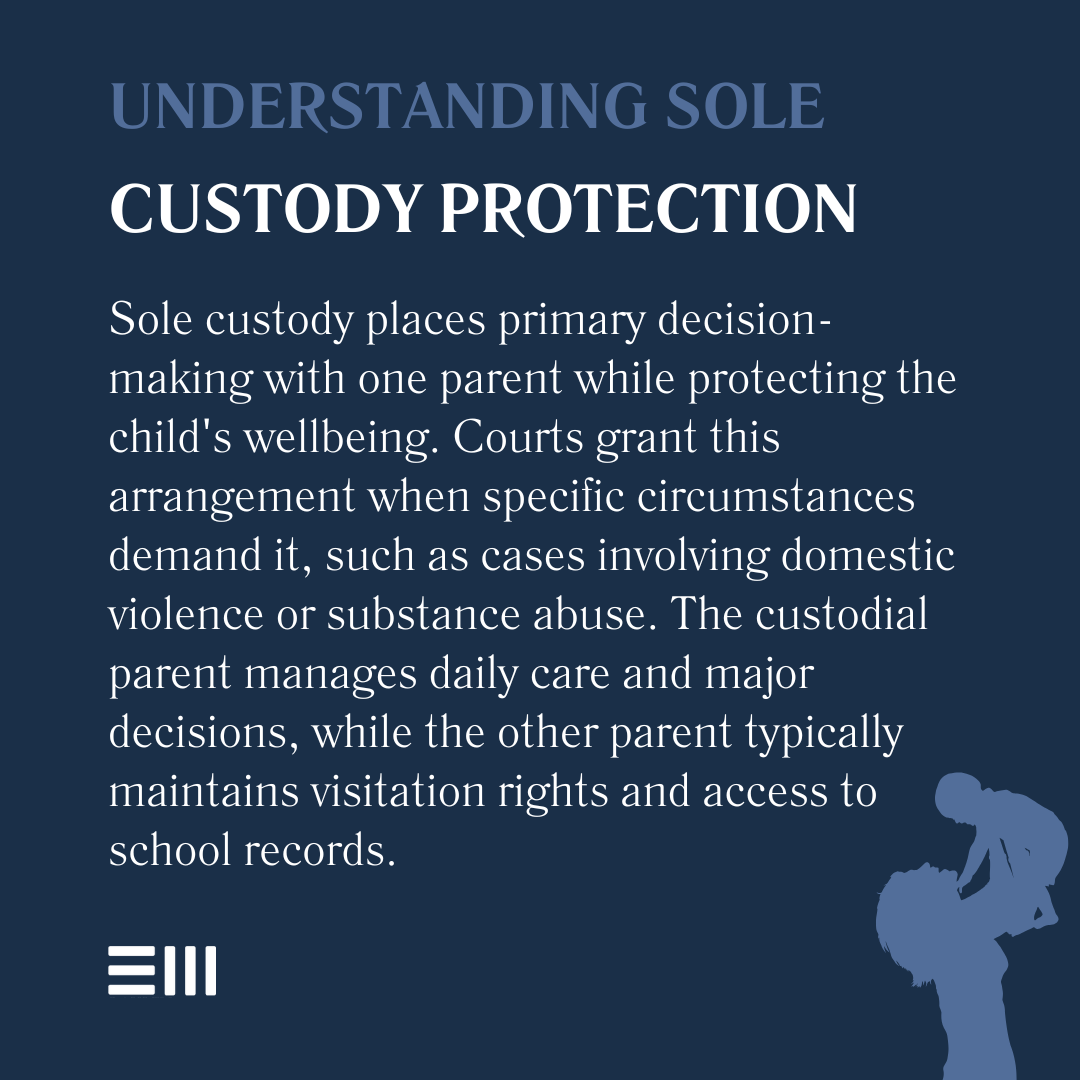Behind every custody decision in Alabama lies a family seeking to rebuild and children hoping to maintain meaningful connections with both parents.
The choice between joint and sole custody shapes not just weekly schedules, but birthday celebrations, holiday traditions, and daily moments that define childhood.
As Alabama courts increasingly recognize that children thrive with both parents' involvement, understanding these custody arrangements becomes essential for making informed decisions that protect your children's future.
Types of Child Custody in Alabama
Every family's situation presents unique challenges and considerations when determining custody arrangements.
Before exploring specific custody types, it's important to understand that Alabama courts consistently prioritize decisions that serve the best interests of the child.
- Physical Custody: Determines where the child primarily lives
- Legal Custody: Covers decision-making authority for education, healthcare, and religion
- Joint Custody: Both parents share responsibilities and decision-making
- Sole Custody: One parent maintains primary control over major decisions
Understanding these distinct custody arrangements helps parents better advocate for their children's needs throughout the legal process.
Understanding Joint Custody
Joint custody arrangements in Alabama reflect modern research showing children benefit from maintaining strong relationships with both parents. Here's what parents should know about this increasingly common arrangement.
Key Components of Joint Custody
Understanding the fundamental elements of joint custody helps parents prepare for this collaborative arrangement. Here are the essential aspects that form the foundation of joint custody:
- Shared decision-making responsibilities;
- Flexible visitation schedules;
- Equal input on major life decisions;
- Collaborative approach to parenting; and
- Regular communication between parents.
These components work together to create a balanced and supportive environment for children of separated parents.
Benefits of Joint Custody
Research consistently shows that children thrive when both parents remain actively involved in their lives. Consider these significant advantages of joint custody arrangements:
- Maintains strong bonds with both parents;
- Reduces emotional impact on children;
- Provides stability through shared parenting;
- Encourages cooperative co-parenting; and
- Allows children to maintain established routines.
These benefits contribute to better emotional and social outcomes for children in joint custody situations.
Potential Challenges
While joint custody offers many advantages, parents should be prepared to address certain obstacles that may arise. Common challenges include:
- Requires effective communication between parents;
- May involve complex scheduling;
- Can be difficult with high-conflict relationships;
- Needs geographical proximity; and
- Demands flexibility from both parents.
Recognition and preparation for these challenges help parents develop strategies to overcome them effectively.
Joint custody arrangements work best when parents can maintain open communication and prioritize their children's needs above personal differences.
Understanding Sole Custody
Sole custody arrangements serve specific situations where one parent assumes primary responsibility for the child. This arrangement may better serve some families' unique circumstances.
Key Components of Sole Custody
To fully grasp the implications of sole custody, parents should understand its core elements.
The following components define the structure of sole custody arrangements:
- Primary decision-making authority;
- Principal physical custody;
- Defined visitation schedule;
- Clear lines of responsibility; and
- Structured communication protocols.
These elements create a clear framework for parental responsibilities and rights under sole custody.
When Sole Custody May Be Appropriate
Certain circumstances may indicate that sole custody serves the child's best interests.
Consider these situations where courts commonly grant sole custody:
- History of domestic violence;
- Substance abuse concerns;
- Mental health challenges;
- Geographic distance between parents; and
- Demonstrated inability to co-parent effectively.
Each of these factors requires careful documentation and consideration by the court when determining custody arrangements.
Rights of Non-Custodial Parents
Even in sole custody arrangements, non-custodial parents retain important rights regarding their children.
These fundamental rights include:
- Scheduled visitation time;
- Access to medical records;
- Information about education;
- Right to attend school events; and
- Input on major decisions when specified.
Understanding and protecting these rights helps maintain meaningful parent-child relationships despite sole custody arrangements.
Frequently Asked Questions About Child Custody in Alabama
Parents navigating custody decisions often encounter complex questions about their rights and responsibilities.
The following answers address the most common concerns while providing practical guidance for Alabama parents.
How Do Courts Determine Custody in Alabama?
Alabama courts carefully weigh multiple factors to ensure custody decisions serve children's best interests.
Key considerations include:
- Child's relationship with each parent;
- Parents' ability to provide care;
- Child's established routine;
- Each parent's physical and mental health; and
- Child's preference (if age-appropriate).
Understanding these factors helps parents prepare appropriate documentation and demonstrate their ability to meet their children's needs throughout the custody process.
Can Custody Arrangements Be Modified?
Changes in life circumstances may necessitate adjustments to existing custody arrangements. Courts consider these significant factors when evaluating modification requests:
- Significant lifestyle changes;
- Relocation considerations;
- Changes in child's needs;
- New marriage; and
- Health issues.
Successfully pursuing modifications requires demonstrating how these changes impact the child's best interests and warrant custody adjustments.
How Does Relocation Impact Custody?
When parents consider moving, several crucial factors influence how courts view relocation requests:
- Distance of move;
- Impact on visitation;
- Educational opportunities;
- Family support systems; and
- Child's established connections.
Courts carefully balance the moving parent's rights with maintaining meaningful relationships between children and both parents.
What Rights Do Grandparents Have?
Alabama law recognizes the importance of grandparent relationships while protecting parental rights.
Important considerations include:
- Existing relationship with grandchild;
- Parent's fitness;
- Best interest of child;
- Prior living arrangements; and
- Family circumstances.
These factors help courts balance grandparental visitation rights with parental authority and children's best interests.
Make an Informed Decision About Your Child's Future
Every child deserves a custody arrangement that provides stability, support, and opportunities for healthy development. Our experienced family law attorneys understand the complexities of Alabama custody laws and can help you navigate this challenging process.
Contact our office today for a confidential consultation about your custody situation. We'll help you understand your options and develop a strategy that protects your children's best interests while respecting your parental rights.


